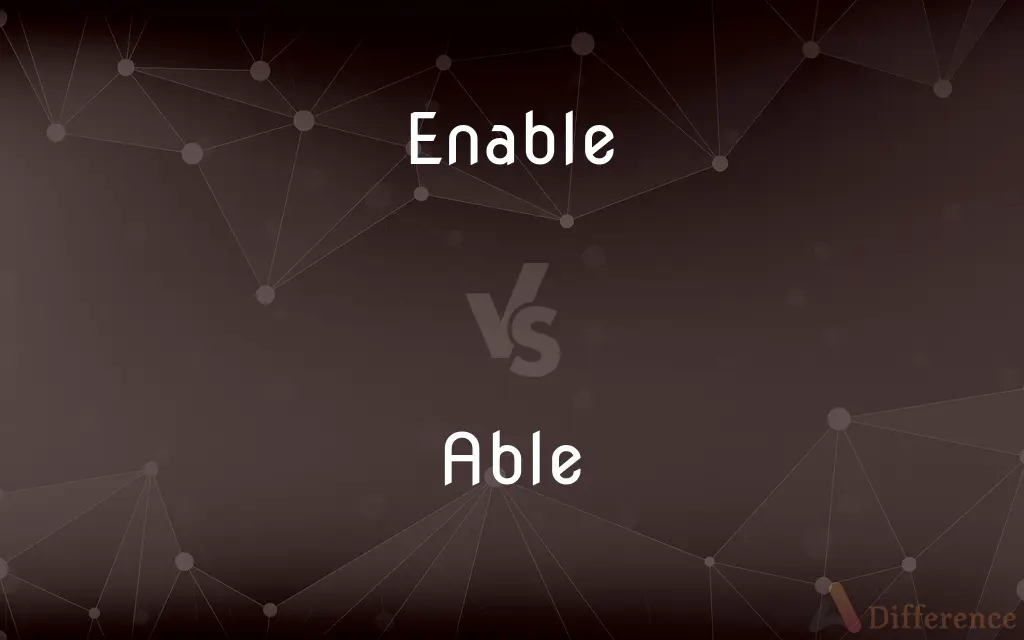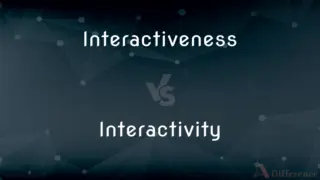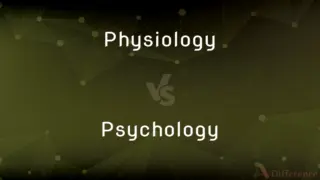Enable vs. Able — What's the Difference?
Edited by Tayyaba Rehman — By Fiza Rafique — Updated on September 30, 2023
"Enable" means to make something possible or operative. "Able" refers to having the skill, power, or means to do something. While "enable" focuses on providing the capacity, "able" denotes already possessing it.

Difference Between Enable and Able
Table of Contents
ADVERTISEMENT
Key Differences
"Enable" and "able" are both verbs that revolve around capability, but they address this concept from different angles. "Enable" emphasizes the act of allowing or facilitating an action or condition. In contrast, "able" underscores the inherent capability or competence of an individual or entity.
When using the word "enable," the focus is often on external assistance or provision. It highlights the granting of permission or tools to allow an individual or system to perform an action. For example, providing software tools might enable an artist to create digital illustrations. On the flip side, "able" is more inward-looking, concentrating on the inherent capabilities or skills of the individual or system. In the same example, the artist would be considered able if they already possess the skills to utilize the software proficiently.
Another way to distinguish "enable" and "able" is by considering the difference between potential and actualized capability. To "enable" means to unlock or provide the potential for an action or state. In contrast, being "able" means that the potential is already realized and can be acted upon without further facilitation.
In the realm of grammar, "enable" is primarily used as a verb, while "able" is an adjective. For instance, one might say, "The course will enable students to understand calculus." Conversely, the use of "able" might be, "She is able to solve complex calculus problems."
Comparison Chart
Part of Speech
Verb
Adjective
ADVERTISEMENT
Focus
Providing capacity or facilitation
Inherent capability or skill
Dependency
Often requires an external source or tool
Refers to an intrinsic quality
Grammatical Use
"This tool enables creation."
"She is able to create."
Nature
Action-oriented
State or condition-oriented
Compare with Definitions
Enable
To make possible or facilitate.
The grant enabled her to continue her research.
Able
Possessing the means or resources required.
With the right tools, she was able to fix the car.
Enable
To provide the means or ability.
The software enables users to edit videos.
Able
Capable of performing a specified action.
He's able to attend the meeting tomorrow.
Enable
To activate or turn on.
She enabled the alarm system before leaving.
Able
Having the skill or proficiency to do something.
He is able to solve complex equations.
Enable
To authorize or permit.
The admin enabled access to the server.
Able
Having sufficient power or resources to accomplish something
A singer able to reach high notes.
A detergent able to remove stains.
Enable
To supply with the means, knowledge, or opportunity (to do something); make able
A hole in the fence that enabled us to watch.
Techniques that enable surgeons to repair the heart.
Able
Usage Problem Susceptible to action or treatment
The brakes were able to be fixed.
Enable
To make feasible or possible
Funds that will enable construction of new schools.
Able
Especially capable or proficient
The new programmers proved to be very able.
Enable
To give legal power, capacity, or sanction to
A law enabling a new federal agency.
Able
Having the necessary powers or the needed resources to accomplish a task.
Enable
To make operational; activate
Enabled the computer's modem.
Enable a nuclear warhead.
Able
Free from constraints preventing completion of task; permitted to; not prevented from.
I’ll see you as soon as I’m able.
With that obstacle removed, I am now able to proceed with my plan.
I’m only able to visit you when I have other work here.
That cliff is able to be climbed.
Enable
To behave in a manner that facilitates or supports (another's abusive, addictive, or self-destructive behavior).
Able
Gifted with skill, intelligence, knowledge, or competence.
The chairman was also an able sailor.
Enable
To make somebody able (to do, or to be, something); to give sufficient ability or power to do or to be; to give strength or ability to.
Able
(law) Legally qualified or competent.
He is able to practice law in six states.
Enable
To affirm; to make firm and strong.
Able
(nautical) Capable of performing all the requisite duties; as an able seaman.
Enable
To qualify or approve for some role or position; to render sanction or authorization to; to confirm suitability for.
Able
Having the physical strength; robust; healthy.
After the past week of forced marches, only half the men are fully able.
Enable
To yield the opportunity or provide the possibility for something; to provide with means, opportunities, and the like.
Able
(obsolete) Easy to use.
Enable
To imply or tacitly confer excuse for an action or a behavior.
His parents enabled him to go on buying drugs.
Able
(obsolete) Suitable; competent.
Enable
(electronics) To put a circuit element into action by supplying a suitable input pulse.
Able
Liable to.
Enable
To activate, to make operational (especially of a function of an electronic or mechanical device).
Able
(obsolete) Rich; well-to-do.
He was born to an able family.
Enable
To give strength or ability to; to make firm and strong.
Receive the Holy Ghost, said Christ to his apostles, when he enabled them with priestly power.
Able
To make ready.
Enable
To make able (to do, or to be, something); to confer sufficient power upon; to furnish with means, opportunities, and the like; to render competent for; to empower; to endow.
Temperance gives Nature her full play, and enables her to exert herself in all her force and vigor.
Able
To make capable; to enable.
Enable
Render capable or able for some task;
This skill will enable you to find a job on Wall Street
The rope enables you to secure yourself when you climb the mountain
Able
To dress.
Enable
To empower or grant the power to act.
The training enabled him to lead the team.
Able
To give power to; to reinforce; to confirm.
Able
To vouch for; to guarantee.
Able
The letter "A" in Navy Phonetic Alphabet.
Able
Fit; adapted; suitable.
A many man, to ben an abbot able.
Able
Having sufficient power, strength, force, skill, means, or resources of any kind to accomplish the object; possessed of qualifications rendering competent for some end; competent; qualified; capable; as, an able workman, soldier, seaman, a man able to work; a mind able to reason; a person able to be generous; able to endure pain; able to play on a piano.
Able
Specially: Having intellectual qualifications, or strong mental powers; showing ability or skill; talented; clever; powerful; as, the ablest man in the senate; an able speech.
No man wrote abler state papers.
Able
Legally qualified; possessed of legal competence; as, able to inherit or devise property.
Able
To make able; to enable; to strengthen.
Able
To vouch for.
Able
(usually followed by `to') having the necessary means or skill or know-how or authority to do something;
Able to swim
She was able to program her computer
We were at last able to buy a car
Able to get a grant for the project
Able
Have the skills and qualifications to do things well;
Able teachers
A capable administrator
Children as young as 14 can be extremely capable and dependable
Able
Having inherent physical or mental ability or capacity;
Able to learn
Human beings are able to walk on two feet
Superman is able to leap tall buildings
Able
Having a strong healthy body;
An able seaman
Every able-bodied young man served in the army
Able
Having physical or mental capacity.
After the accident, he wasn't able to walk for a while.
Able
Competent in a particular area.
She's more than able to handle the responsibility.
Common Curiosities
Is "able" always about skills?
No, "able" can also refer to having the means or physical capacity to do something.
Can "enable" be used in negative contexts?
Yes, "enable" can refer to allowing negative behaviors or actions, as in "enabling bad habits."
What is the noun form of "enable"?
The noun form is "enabling."
How is "enable" different from "empower"?
"Enable" means to make possible or provide means, while "empower" implies giving power or authority.
How do I use "enable" in a sentence?
For instance, "This feature enables you to connect with friends."
What is the opposite of "able"?
The opposite of "able" is "unable."
What does "be able to" mean?
It's another way of saying "have the capacity or skill to."
Can "able" be used to describe objects?
Yes, like "This computer is able to run the program."
Share Your Discovery

Previous Comparison
Interactiveness vs. Interactivity
Next Comparison
Physiology vs. PsychologyAuthor Spotlight
Written by
Fiza RafiqueFiza Rafique is a skilled content writer at AskDifference.com, where she meticulously refines and enhances written pieces. Drawing from her vast editorial expertise, Fiza ensures clarity, accuracy, and precision in every article. Passionate about language, she continually seeks to elevate the quality of content for readers worldwide.
Edited by
Tayyaba RehmanTayyaba Rehman is a distinguished writer, currently serving as a primary contributor to askdifference.com. As a researcher in semantics and etymology, Tayyaba's passion for the complexity of languages and their distinctions has found a perfect home on the platform. Tayyaba delves into the intricacies of language, distinguishing between commonly confused words and phrases, thereby providing clarity for readers worldwide.














































